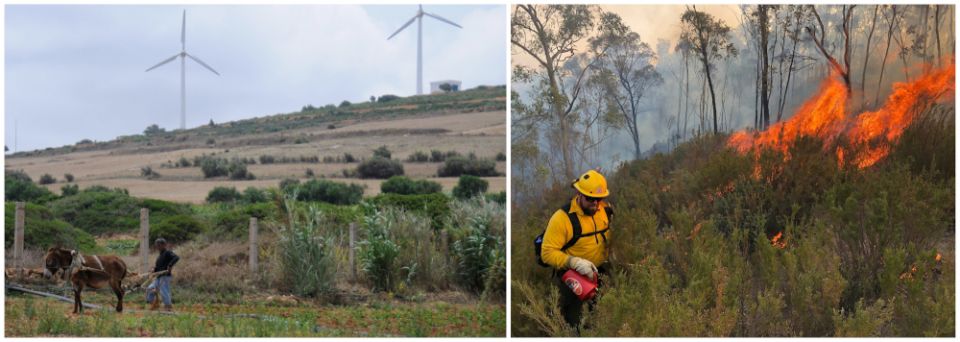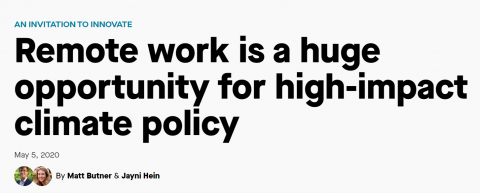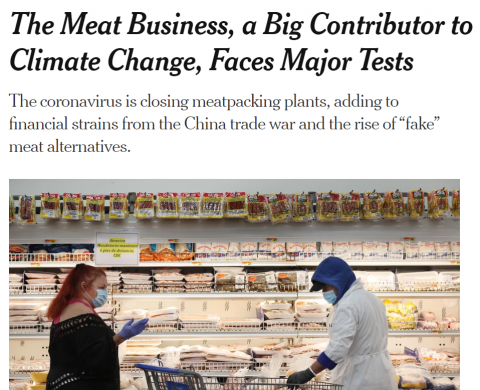Welcome to Burning Questions, the EarthBeat feature that takes on those questions smoldering in your mind about climate change and religion — from the basics to more complex, and everything in between. Have a Burning Question of your own? Let us know
We know that moments of global crisis have historically led to change. We can expect that our current crisis will do the same. What's still up in the air is how.
In terms of the pandemic's effect on the fight against climate change, experts say we're currently looking at one of two possible scenarios playing out.
Option A: The coronavirus pandemic will push society and its leaders to be more proactive about heading off future risks (i.e. the climate crisis). We'll listen more attentively to the prophetic wisdom of scientists and experts. And we'll ultimately recognize the role of our governments – which, for their part, are now more willing to work together – to take decisive action for the sake of the common good. In short, the pandemic wakes the world up.
Option B: Short-term environmental benefits from the lockdown are overhyped and short-lived. Carbon emissions skyrocket in efforts to kickstart the economy and return to normalcy. Political will for comprehensive climate action virtually disappears. Basically, the pandemic amounts to a whole lot of lost time in the race to tackle global warming. (Remember, the UN has warned that the world only has about 10 years to limit warming to 1.5C and avoid a climate catastrophe.)
Which narrative do you find more likely? The scenario that will ultimately win out might just be the one that tells the more compelling story.
Advertisement
Advertisement
If people believe that the only way to protect the environment is through draconian measures and strict lockdowns that further upend their lives, Option B will likely be our future.
But, as Elizabeth Sawin, co-director of the think tank Climate Interactive, told Yale E360, "if we can tell that story of what we just went through and help people understand that this is an accelerated version of another story we're going through that has the same plot structure but a different timeline, that could be transformative."
In other words, for Option A to become reality, we need to take stock of what lessons the pandemic has taught us and recognize what long-term changes – both systemic and personal – are now made possible.
So let's do just that, and look at what our experience of the pandemic suggests about some of the changes the world can make to address climate change.
Possible change 1: Green stimulus
Kristalina Georgieva, the managing director of the International Monetary Fund, recently called the coronavirus pandemic the worst economic crisis since the Great Depression.
Recovery from such a crisis will of course require huge stimulus packages from governments. Environmental advocates argue that green stimulus packages are the best option for recovery, simultaneously providing millions of high-quality jobs while also transitioning the country to a 21st century green economy.
A study from Oxford University found that projects that cut greenhouse gas emissions and stimulate economic growth provide higher returns on government spending in both the short-term and long-term when compared to conventional stimulus spending.
A green stimulus package also would likely benefit marginalized communities. In an April 24 EarthBeat article, sociologist Daniel Aldana Cohen and energy expert Daniel Kammen argued a $2 trillion Green Stimulus plan in the United States would not only get the economy back on track but "improve the quality of life, especially in low-income communities, communities of color, and indigenous communities, which have suffered the most disinvestment and pollution in recent decades."
Financial markets seem to be pointing us towards a green recovery. Considering the devastation the pandemic is inflicting on the oil industry, investments in fossil fuels appear bleaker than ever. According to Yale E360, financial analysts believe the fall in oil prices and lost profitability in the oil industry could free up cash for renewable energy investments, as well as encourage governments to switch economic stimulus packages away from fossil fuels over to clean energy.
Possible change 2: Shrunken supply chains and less international trade
Before the pandemic hit, global supply chains – the system of all the people, businesses and activities involved in creating a product – were already shrinking. Tariffs and growing trade tensions like that between the U.S. and China were contributing to slowing of international trade.
Now, the pandemic threatens the end of the global supply chain, with some experts arguing supply chains need to shrink to get stronger.
Amy Myers Jaffe, director of the Program on Energy Security and Climate Change at the Council on Foreign Relations, told Yale E360 that shrunken supply chains and more domestic production of goods can structurally reduce oil demand and decrease shipping's carbon footprint.
Possible change 3: Less travel, more remote work
One of the most notable and noticeable connections between coronavirus and climate change is in the sharp decline of commercial air travel, one of the worst emitters of greenhouse gasses in the world. People are not only flying less, but dramatically less. Compared to this time last year, air travel is down 90 percent.
That decline has rocked the airline industry, pushing it into a financial crisis that threatens its ability to meet its own self-imposed emission reduction targets. When Congress passed a $2 trillion stimulus package in March, airline lobbyists were able to remove a provision that would require airlines to halve their emissions by 2050, even though that was the target they originally had set for themselves.
Before the virus, airline travel and its subsequent emissions were rapidly rising. Although it currently only makes up about 2.4 percent of global carbon emissions, one study found that the aviation industry could consume a quarter of the world's "carbon budget" by 2050.
If businesses and individuals become more able and willing to accomplish tasks via virtual meetings instead of in-person ones, that could go a long way in preventing that projected rise and actually reduce emissions. That's because flying is the single most damaging travel method for the climate, and flying less often is the most effective way individuals can reduce their carbon footprint.
Along those lines, the rise of telecommuting to work can also play a major role in greenhouse gas reduction. Consider this, a study from the University of Chicago found that 37 percent of jobs in the United States can now be performed entirely at home.
Coming out of the pandemic, businesses, organizations and individuals might just decide working from home is the most efficient option for them. The more people that stay home, the more cars will be kept off the road and the less gas burned. In a country where transportation is the number one emitter of greenhouse gasses, that would be a huge deal.
Possible change 4: A change in our diets
By now you might have heard that we are facing an impending meat shortage in this country. The pandemic has left meat processing plants unable to remain open, which could cause meat supply issues lasting up to a year.
What does this mean? Less variety and more expensive meat for the average consumer.
In past economic recessions, people have tended to eat less meat. The current crisis seems to be heading in that same direction. But if that short-term change can become a long-term habit for most Americans, there's potential for substantially shrinking our carbon footprints.
Environmentalists have been urging Americans to eat less meat, particularly beef, to reduce their carbon footprints for some time now. In August, the Intergovernmental Panel on Climate Change released a special report describing plant-based diets as an opportunity for mitigating climate change. One 2019 study found that if all Americans reduced their meat consumption by a quarter, we'd reduce our greenhouse gas emissions by 82 million metric tons each year.
Crisis as opportunity
A report from the Brookings Institute notes: "Crises are generally viewed as dangerous, expensive, and detracting from other agendas and priorities. However, a look back in history illustrates that crises and extreme threats can be useful for directing individuals, a country, and even the world to a solution."
"During a crisis, incentives and motivations change, potentially leading to new cooperative behaviors and even to the creation of new systems or structures," Brookings reports. "Crises can get the collective adrenaline flowing, focusing minds to solve the problem at hand."
Our current crisis has cost us jobs, money, time and lives. But the sudden changes the pandemic has induced present us with an opportunity to question our world more deeply. How we respond to that opportunity will determine how we address the climate crisis moving forward.
One day the pandemic will end. When that day comes, if we recognize some of these positive changes as viable and actually implement them, we have a good chance at addressing climate change. If we decide to just go back to business as usual, we can expect even more crises not too far down the road.
[Jesse Remedios is a staff writer with National Catholic Reporter's EarthBeat. His email address is jremedios@ncronline.org. Follow him on Twitter: @JCRemedios]






